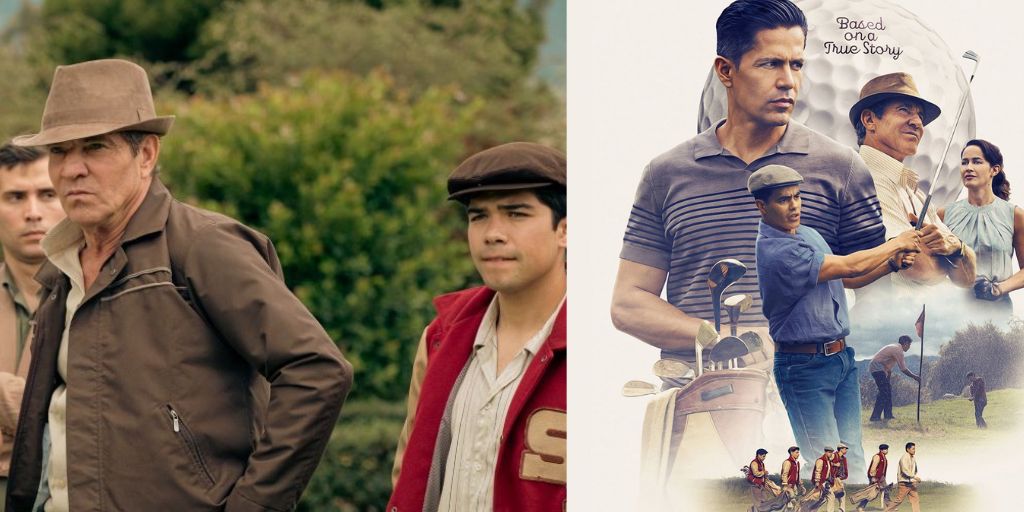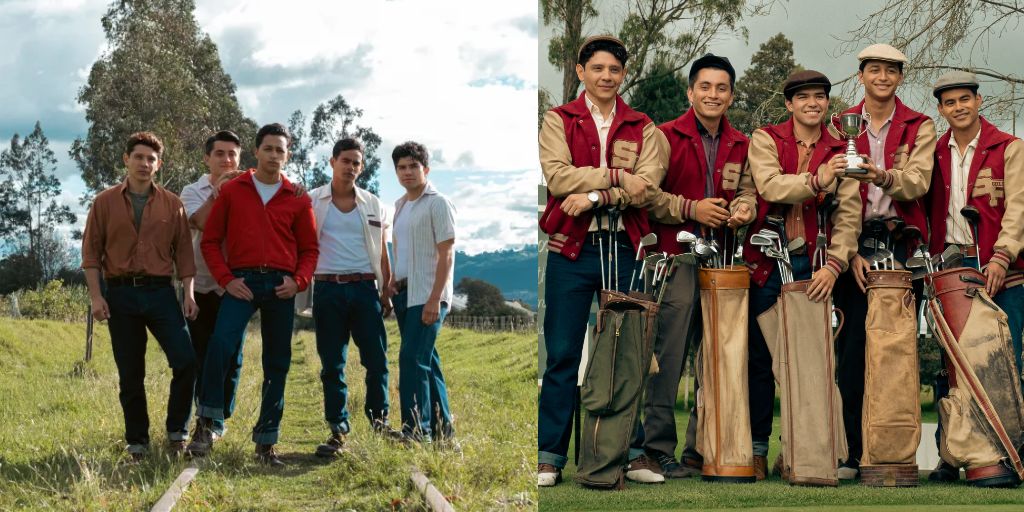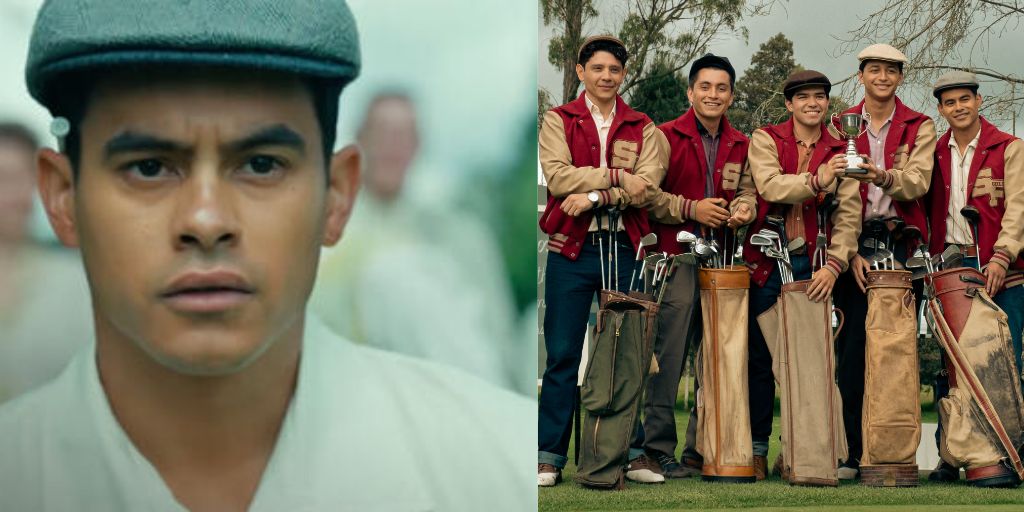Golf is very popular in Texas, especially in high schools. The new drama on Netflix, The Long Game, tells the inspiring true story of five Mexican-American teenagers and their coaches in segregated South Texas. The movie shows how they fought against racism and cultural appropriation in the 1950s to become champions. It is based on the 2010 novel Miracle Mustangs by Humberto G. Garcia.
The film stars Jay Hernandez as JB Peña, a man who believed that he and his Latino students from San Felipe High School should not be just caddies or be kept out of the best country clubs in Southwest Texas.
Directed by Julio Quintana, the film also features Dennis Quaid as Frank Mitchell, a pro golfer who supports Peña and his team, and Cheech Marin as a club groundskeeper who helps the “Miracle Mustangs.”
In the 1950s, in the Texas town of Del Rio, Mexican-American teenagers were expected to be caddies for white golfers at the local country club. Joe Treviño (played by Julian Works) is the leader of a group of young Mexican-American golf enthusiasts who have no place to play.
JB Peña, the new high school superintendent, decides to start San Felipe’s first golf team at the all-Mexican-American school. Joe and his friends—Mario Lomas, Felipe Romero, Lupe Felan, and Gene Vasquez—form the first team with Peña and Frank Mitchell as their coaches. They confront the racism and biases of 1950s Texas and become one of the best high school golf teams in the state, winning the State Championship in 1957.

While many films focus on the civil rights struggles of the 1960s for African-Americans, there are fewer about the challenges faced by Mexican-Americans in Texas during the years before Martin Luther King and the larger civil rights movement.
The Long Game provides a compelling story about how real people like Peña and Treviño were viewed as inferior by a white, elitist society. Peña’s goal was to show that Mexican-Americans were just as capable and talented as their white counterparts. As the San Felipe Mustang golf team gets closer to winning the Texas State Championship, viewers are treated to several inspiring moments that make the movie engaging.
The Long Game is not only about the fight for equal rights but also features a touching love story between Joe and the intelligent local girl Daniela Torres (Paulina Chávez). Joe must balance his focus on golf with his growing feelings for Daniela. Their chemistry is believable, and their relationship adds a personal touch to the larger story of human rights and equality.
The movie highlights the broader issues of poverty, illiteracy, and racism that these young players and their coaches faced. Gene Vasquez shared in a 2023 SXSW interview that despite growing up in poverty and discrimination, they turned to golf as an escape and a way to prove themselves. The film also prompts viewers to consider current immigration issues and the people affected by them.
In 2012, the “Miracle Mustangs” were inducted into the Latin American Sports Hall of Fame. At the end of the film, there is an epilogue about where the real-life players and coaches are now. Joe Treviño, the team’s leader, chose not to pursue a golf career but spent his life refurbishing clubs and giving lessons until his death in 2014.
Gene Vasquez, also portrayed in the film, worked in education and real estate and passed away last year. Felipe Romero played professional golf and worked as a bus conductor and instructor. Lupe Felan served in the Marine Corps and the California DMV, and Mario Lomas worked as a caddie and greenskeeper but has since lost touch with the group.
Golf is very popular in Texas, especially in high schools. The new drama on Netflix, The Long Game, tells the inspiring true story of five Mexican-American teenagers and their coaches in segregated South Texas. The movie shows how they fought against racism and cultural appropriation in the 1950s to become champions.
It is based on the 2010 novel Miracle Mustangs by Humberto G. Garcia. The film stars Jay Hernandez as JB Peña, a man who believed that he and his Latino students from San Felipe High School should not be just caddies or be kept out of the best country clubs in Southwest Texas.
Directed by Julio Quintana, the film also features Dennis Quaid as Frank Mitchell, a pro golfer who supports Peña and his team, and Cheech Marin as a club groundskeeper who helps the “Miracle Mustangs.”

In the 1950s, in the Texas town of Del Rio, Mexican-American teenagers were expected to be caddies for white golfers at the local country club. Joe Treviño (played by Julian Works) is the leader of a group of young Mexican-American golf enthusiasts who have no place to play.
JB Peña, the new high school superintendent, decides to start San Felipe’s first golf team at the all-Mexican-American school. Joe and his friends—Mario Lomas (Christian Gallegos), Felipe Romero (Miguel Angel Garcia), Lupe Felan (José Julián), and Gene Vasquez (Gregory Diaz IV)—form the first team with Peña and Frank Mitchell as their coaches.
They confront the racism and biases of 1950s Texas and become one of the best high school golf teams in the state, winning the State Championship in 1957.
While many films focus on the civil rights struggles of the 1960s for African-Americans, there are fewer about the challenges faced by Mexican-Americans in Texas during the years before Martin Luther King and the larger civil rights movement.
The Long Game provides a compelling story about how real people like Peña and Treviño were viewed as inferior by a white, elitist society. Peña’s goal was to show that Mexican-Americans were just as capable and talented as their white counterparts.
As the San Felipe Mustang golf team gets closer to winning the Texas State Championship, viewers are treated to several inspiring moments that make the movie engaging.
The Long Game is not only about the fight for equal rights but also features a touching love story between Joe and the intelligent local girl Daniela Torres (Paulina Chávez). Joe must balance his focus on golf with his growing feelings for Daniela. Their chemistry is believable, and their relationship adds a personal touch to the larger story of human rights and equality.
The movie highlights the broader issues of poverty, illiteracy, and racism that these young players and their coaches faced. Gene Vasquez shared in a 2023 SXSW interview that despite growing up in poverty and discrimination, they turned to golf as an escape and a way to prove themselves. The film also prompts viewers to consider current immigration issues and the people affected by them.
In 2012, the “Miracle Mustangs” were inducted into the Latin American Sports Hall of Fame. At the end of the film, there is an epilogue about where the real-life players and coaches are now. Joe Treviño, the team’s leader, chose not to pursue a golf career but spent his life refurbishing clubs and giving lessons until his death in 2014.
Gene Vasquez, also portrayed in the film, worked in education and real estate and passed away last year. Felipe Romero played professional golf and worked as a bus conductor and instructor. Lupe Felan served in the Marine Corps and the California DMV, and Mario Lomas worked as a caddie and greenskeeper but has since lost touch with the group.





